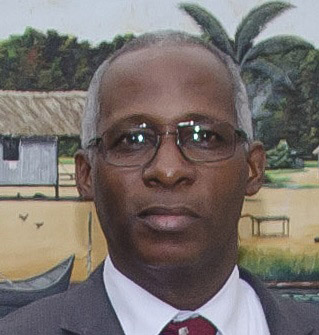Board Chairman Leslie Sobers yesterday maintained that the Guyana National Broadcasting Authority (GNBA) did not willfully deny Guyana Publications Incorporated (GPI), the publisher of the Stabroek News and Sunday Stabroek, a radio licence, while noting that the company only became fully compliant in October last year, by which time all the primary zone frequencies were already allocated.
“I want to, upfront, deny what seems to be an allegation and to reiterate that at the GNBA we operate at a professional level and we would not purposefully exclude anyone from obtaining a licence to broadcast. The electro-magnetic spectrum belongs to Guyanese. We are merely caretakers of it. We are merely regulators of it to ensure that our people benefit from it in every way possible and the best way possible,” Sobers told a press conference hosted at the GNBA’s headquarters.
The news conference was called in response to a report published by Sunday Stabroek on June 16th, under the headline “Stabroek News’ publisher sees unfair treatment in denial of radio licence.” In the report, GPI General Manager Shaleeza Khan said the company had been treated unfairly by the GNBA in the denial of its application for a primary zone radio licence.
Khan’s comments were made following the receipt of a letter from the GNBA informing her that the company’s application for a radio licence for the operation of a station in the primary zone could not be processed. (The primary zone covers Georgetown, Region Three up to the Essequibo River, all of Region Four and Region Five east of Region Four to the Abary River.)
In a comment in response to the press conference yesterday, Stabroek News Editor-in-Chief Anand Persaud said Sobers’ explanation was unconvincing.
Sobers stated that the chronological details in the newspaper’s report could not be denied but added that it did not tell the “whole story” as it did not address actions and circumstances from the point of view of the GNBA. (Repeated efforts were made ahead of the publication of the report to solicit a comment from Sobers and other GNBA officials on the issue but these were unsuccessful.)
According to Sobers, GPI had applied for broadcast licenses for the first time in February, 2016, at which point the GNBA board was not in place. He noted that once appointed, the board picked up from where the previous board had left off. He added that a second application was received on November, 2017, by which time the board had already deliberated on applications for licences.
“They fully well know that they sent in a second application November 24, 2017, but the meeting of November 15, 2017 of the board could not reasonably have contemplated an application from GPI because there was none,” he said, while noting that due to the amendment of the broadcast legislation, all applicants had been asked to reapply in 2017.
“So there could have been no deliberation concerning Stabroek News,” he added.
Licensing Officer Arifa Persaud, who was also present at the press conference, also noted that one of defects in GPI’s application was the fact that it was applying as a newspaper company. Section 23(1) of the Broadcasting Act states:
“A licence shall be issued only to a company incorporated or continued under the Companies Act, or to a trust, either of which must fulfil the following conditions –
(a) the only business carried on, or proposed to be carried on, by the company or trust shall be all or any of the following –
(i) the establishment and operation of broadcasting service;
(ii) the establishment and operation of such associated telecommunication services ancillary to the operation of the category of broadcasting service concerned as may be authorised under the Telecom-munications Act or its successor;
(iii) the carrying on of such forms of business as may be directly connected or associated as those mentioned in subparagraphs (i) and (ii);”
“In the sum total, a company or a trust must only be in the business of broadcasting, or something relating to broadcasting. You can’t be in the newspaper business and apply for a radio, broadcasting or cable licence. This was the position they found themselves when they were looking at the second application,” Sobers noted.
‘It won’t be fair’
Sobers also said GPI, or Radio Stabroek Incorporated (RSI), only became fully compliant on or about October 26th, 2018, almost a year after the board’s deliberation on licences.
“So we are looking here at from… November the previous year to October 2018, that is when they became fully compliant, having gone and registered a company and so on and put in their things in place,” he explained.
By that time, he said all the frequencies in the primary zone were already allocated. “So for [GPI] to be at odds with GNBA on that score seems to suggest that in the minds of the management of GPI, GNBA ought to have kept a frequency. First of all we don’t issue the frequencies. It is the NFMU [National Frequency Management Unit] that issues the frequencies, so I can’t dictate for NFMU but I think NFMU would be operating quite similarly to how we operate, dealing with persons as they become fully complaint,” Sobers further stated.
He said the company cannot expect the GNBA or the NFMU to come to “a standstill” until it became compliant. “It won’t be fair. So we went on with our business and we issue licences to persons who were able to secure their frequencies from NFMU,” he said.
Arifa Persaud noted that there is a monthly legal and licensing committee meeting and the committee would have verified and recommended licences to the board. Once the applicants are fully compliant, meaning they have provided all the supporting documents and have all the requirements in place, Persaud said the board would then make approvals. “So when the board recommends that or approve in that case, it is then sent to our sister agency [the NFMU]. Our sister agency provides the spectrum,” she said. “This is where, it was recognised that spectrums were already given out in the primary zone and that is what was indicated to GPI,” she added.
Sobers further contended that the fact that the application from GPI was tabled at a board meeting also proves that the licensing committee had recommended that it be given a licence and therefore it could not be claimed that there is an “untoward plot” within GNBA to exclude GPI from getting a licence.
He also pointed out that there are a number of entities that would have also applied for broadcast licences long before GPI and they are still awaiting approval because they are not fully compliant. “For example, MTV, since September, 2014. HGPTV, since 2013. These two companies, just to name two, have applications in longer than Stabroek News,” he said. “That is the situation. We would like it to be made clear that we have no political agenda and the board is not directed by any politician or any person in political office,” he added.
Flimsy grounds
Meanwhile, Stabroek News’ Editor-in-Chief noted that Sobers’ board was appointed in February in 2017 and held a statutory meeting to consider new applicants on November 15th, 2017. Despite the clear interest of RSI’s parent company in a radio licence going all the way back to 1993, he said, there was no communication by Sobers’ board or by any officer of the GNBA to the company that applications would be considered by the board for a decision and neither was there any notification then of any defect in its application. As a result, he said that was not transparent behaviour by the GNBA and opened up the opportunity for other considerations to be made in selections.
He further noted that it was not until January 12th, 2018 that the company was formally advised by the GNBA that there had been a statutory meeting on November 15th, 2017, when the decisions had been made. Persaud queried whether the applicants who were awarded licences on January 5th, 2018 had been communicated with by the Sobers board in the period between February 17th, 2017 and November 15th, 2017. Persaud said the release by the GNBA of the chronology connected to these applicants and those awarded on December 14th, 2018 could help to clarify matters.
He said it remained the case that the eventual successful licensees fell into the category of those who could be considered “friends and family” of the administration and RSI’s parent company, which had been in the media business since 1986, had been denied a licence in the primary zone, where it is headquartered, on flimsy grounds.
GPI has been seeking a licence since 1993 and since that time has submitted multiple applications under successive governments.
Under the current administration, on January 6th, 2016, the company submitted to the GNBA an application that had been previously submitted to the NFMU. The application was submitted after the GNBA said it did not have any application on file for the company.
However, two days later the company received a letter from the GNBA requesting that the application be redone on a form that the agency provided. The application was resubmitted on February 17th, 2016. Two days later, on February 19th, 2016, supporting documents for the application was submitted to the agency.
More than a year elapsed and on November 23rd, 2017, another application was submitted to the GNBA in keeping with the amended Broadcasting Act, along with the application processing fee.
Prior to then president Bharrat Jagdeo’s administration handing out numerous licences in November of 2011 to persons deemed close to him, GPI had submitted applications for licences to the NFMU, dating back to April 8th, 1993.









